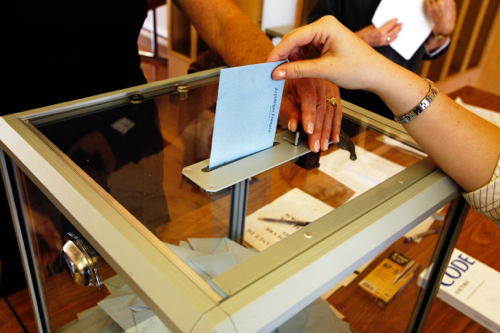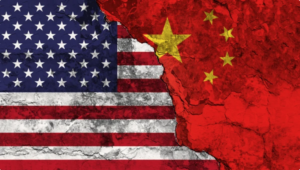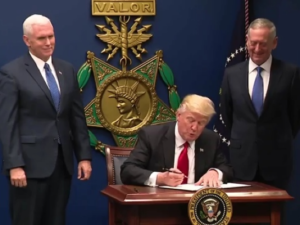French Elections, Chinese Purchases, and Canada’s Constitution
Here’s What You Need To Know
We are now just over two weeks away from the first round of what Is being touted as potentially one of the most impactful elections in modern European history. On April 23rd the French people will vote in the first round of their presidential election, after which the top two finishers will face off in the second round to be held on May 7th.
- The State Of Play: In the first round of voting, the French electorate is choosing from a staggering eleven candidates. These include Marine Le Pen, of the right-wing National Front, Emmanuel Macron, from the recently formed “En Marche!” movement, Francois Fillon, of the center-right French Republicans, Benoit Hamon, of the currently ruling Socialist Party, Jean-Luc Melenchon, of the leftist Parti de Gauche, and six other candidates from minor political parties who made the ballot. Of these candidates, the two who appear poised to move on to the May 7th final round elections are Le Pen and Macron. Francois Fillon, the former right-of-center front-runner, who was originally seen as Le Pen’s likely opponent in the second round, has been sidelined by several scandals. At the moment, conventional wisdom (and polling) seems to suggest that Le Pen may take first place in the first round of voting, but Macron will take a significant lead in the second round head-to-head with Le Pen. However, these are the same polling methods that claimed Brexit would never happen and Donald Trump would never be elected.
- The Truth About Le Pen: Since taking over the leadership of the National Front from her father, in 2011, Le Pen has made international headlines as a radical right-wing populist. As candidates and campaigns with populist messages have begun gaining traction around the globe, Le Pen has been eyed as a serious contender for the French presidency. Many in France and around the world are expressing serious (and likely hyperbolic) concern over Le Pen’s potential victory. These concerns seem to miss the point that, as outlined above, there is a massive field of candidates in the first round of voting. It only stands to reason that the loudest, most controversial of those candidates gets most of the attention. When it comes to a head to head race, there appears to be little to suggest that the French electorate is actually seeking Le Pen’s brand of radical change. Likewise, even if Le Pen were to win, she will inevitably learn the lesson of all outsider candidates: It’s easier to talk about power when you don’t have it. Fears that she may follow through on declarations of dropping the Euro and potentially withdrawing from the EU may very well go the same way as Donald Trump’s campaign promises to radically renegotiate or pull out of NAFTA. The truth about Le Pen is that she isn’t nearly as likely to win in the second round as some are predicting, and she’s even less likely to be able to enact the most controversial of her campaign promises even if she does win.
- The Truth About Macron: With Fillon more or less out of the race, Macron has become the likely centrist, establishment candidate to make it to the runoff with Le Pen. Macron has billed his campaign as that of an outsider and has and vowed to spark a “democratic revolution” against the nation’s careerist politicians. Despite never having held elected office, he did serve in the current government as the appointed Minister of Economy, Industry, and Digital Affairs. Macron’s message is a delicate balance, walking a line that distances him from the current Hollande government, which French voters hold a decidedly negative view of, while not straying so far from the establishment as to scare moderate voters. Despite his campaign rhetoric to “transform, not reform” the French government, Macron has promoted moderate, pro-business policies favorable to the center-right and has served in government with the center-left Socialists. The truth about Macron is that, despite the talk of radical transformation, he’s probably one of the most centrist candidates in modern French political history.
The upcoming French presidential election will undoubtedly receive wide international coverage, with everyone trying to read into the global significance of whatever the results end up being. The truth is, all politics are still local, and the French electorate does not actually seem interested in embracing Le Pen’s policy agenda. Macron appears the much safer bet to succeed the unpopular Hollande government, even though he was until last year a part of it.
News You Can Use
ECONOMIC GUT CHECK
Looking at consumer confidence alone, you’d think the U.S. economy was booming. Numerous recent surveys of consumers, small business owners, and Fortune 500 CEOs all show record levels of optimism about the economy. Despite this public sentiment, the economic data paints a slightly bleaker picture. Last year marked the weakest economic expansion since 1945; business spending has failed to pick up, retail sales have slowed, auto sales have struggled, and business creation has become stagnant. This divergence between soaring optimism over the economy’s performance matched with fairly stagnant data on economic growth has economists offering muted projections for the economy’s performance. The question is whether this positive sentiment fuels stronger growth or crashes due to broader economic trends hitting their pocketbooks in the long run.
Subscribe to Receive Insights
"*" indicates required fields
H-1B PANIC
There was a flurry of concern this week over confusion regarding a supposed policy change by the U.S. Citizenship and Immigration Services that would have reportedly meant computer programmers were no longer eligible for H-1B visas. Following these reports, a USCIS spokeswoman clarified that there was no policy change made and the policy memo in question was merely explaining current policy for a Nebraska call service center. However, there remains confusion over whether the memo is reinterpreting current policy to maximize scrutiny for entry-level computer programmers seeking H-1B visas, or if the original panic over the memo was entirely unfounded. The chaos and confusion caused by the clumsy release of a policy memo on an issue as closely scrutinized as H-1B visas illustrates exactly how undisciplined communications continue to lead to the rumors and misinterpretations that have plagued the Trump Administration for the past several months.
A CHINESE INTEL GRAB?
A Chinese firm partially owned by the government is currently seeking approval to acquire the American cash transfer business MoneyGram. But Congressman Robert Pittenger (R-NC) is calling for greater scrutiny of the deal due to concerns that the purchase may grant the Chinese government access to sensitive information on American citizens. Due to the nature of MoneyGram’s business, the company holds a plethora of transactional data, including names, bank account numbers, and addresses of customers. The Treasury Department is currently reviewing the deal and declined to weigh in yet on the purchase. However given Trump’s criticism of Chinese trade practices and policymakers’ increased concern over cybersecurity, these types of deals may be viewed with skepticism in the Trump Administration, so much so that the White House may directly get involved.
THE NEXT SUBPRIME PROBLEM?
Financial analysts have expressed growing concern over rising subprime auto loan delinquencies, comparing the market to the 2006 real estate market. While those comparisons are likely bombastic – with the auto loan market substantially smaller than real estate and with cars being easily recovered and resold – the trend does show continuing struggles the American middle-class are facing. Most Americans require a car in order to get to their job, take their kids to school, go to the mall to buy retail goods, and, generally speaking, be a productive member of society. Considering the high interest rates these loans often carry, they are placing a substantial burden on middle and working class families who would suffer most from a collapse of this market. How a potential crash of this subprime market may seep into other parts of the economic should be closely watched.
GE READY FOR THE ROBOTS
As the debate over the robotics industry’s impact on the future of the American job market continues, General Electric CEO Jeff Immelt weighed in to curb the concerns on the rise of automation. Under Immelt’s leadership, GE has moved away from more speculative markets like finance and telecom, and refocused on building products – like jet engines and gas turbines. He argues that concerns of robot-driven joblessness are overblown and miss the fact that increases in automation have made Americans richer by allowing workers to focus on higher paying, more valuable tasks. He goes on to explain successful businesses will need to train employees to rise above tasks robots can accomplish. Of course, given GE’s recent investment in robotics, Immelt’s arguments should be taken with a grain of salt. But, his points clearly outline the argument we are likely to hear from industry in the ensuing robotics debate.
CANADIAN CONSTITUTIONAL REFORM?
A recent poll found that an overwhelming majority of Canadian citizens support major changes to the country’s constitution. Specifically, 92 percent support adding a provision to explicitly protect private property rights; 70 percent support enacting term-limits for the Prime Minister to ensure no one can serve in the position for more than eight years; 69 percent would support a measure to eliminate constitutionally mandated affirmative action policies; and 64 percent supported abolishing the Canadian Senate, which is appointed by the Prime Minister. Anytime a population supports major reforms in such large majorities, politicians should take notice. It will not be a surprise if the Conservative Party of Canada bring some of these issues to the forefront when they seek to take back the government in the next election set to take place during or before October 2019.



